by Richard C. Auxier and Alec Tyson
Ten candidates for the 2008 Republican nomination for president squared off for two hours last night in a debate held in New Hampshire and televised nationally by CNN. Here is a run-down of how their views on key issues stacked up against the attitudes of the general public and of self-identified Republicans, Democrats and independents, as measured by recent Pew Research Center surveys.
Iraq
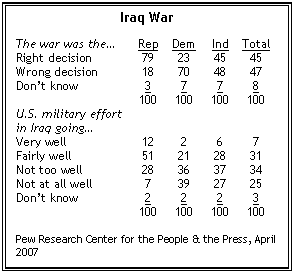
Former Gov. Romney said that invading Iraq was the right decision at the time, and that despite mistakes made in executing the war, the United States had not lost in Iraq. Former Mayor Giuliani also offered a forceful defense of the war, saying that even knowing then what he knows now, the war was “absolutely the right thing to do.” This is a popular position with the Republican rank-and-file; fully 79% of Republicans agree that the U.S. made the right decision in using military force against Iraq. However, Romney, Giuliani, Sen. John McCain and other candidates also discussed what they described as the mismanagement of the war by the Bush Administration. On this point, Republicans are conflicted. Some 49% say they would prefer a Republican candidate who will take a different approach on Iraq from President Bush’s, while 43% want a candidate who will continue Bush’s policies. At the same time, a majority of Republicans still approve of Bush’s handling of the war (65%) and say the war is going “fairly” or “very well” (63%); only 35% say the war is going “not too” or “not at all well” and just 29% disapprove of how Bush is handling the war. As for the general public, 63% expresses disapproval of Bush’s handling of the war and 59% say the war is going “not too well” or “not at all well.”
In response to a question about the troop surge, McCain said the surge needed to be given a chance to succeed and that the consequences would be dire if the U.S. withdrew from Iraq before achieving success. A plurality of Republicans (47%) think the surge is making things better in Iraq, while three-in-ten say it is not having any effect and one-in-ten say it is making things worse. Looking ahead, Republicans are more optimistic about the troop surge, with 65% saying the surge will make things better in the long run. Only 34% of the general public agrees with this view, while a plurality (38%) thinks the surge will have no effect in the long run.
Terrorism
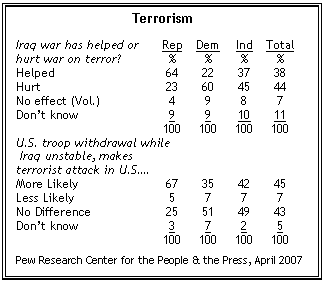
The discussion of terrorism was closely tied to the Iraq war debate throughout the night. McCain stated that should the U.S. fail in Iraq, terrorists will “follow us home” and Iraq will become a base for al Qaeda. McCain finds support for his views within his party, as 64% of Republicans think the war in Iraq has helped the war on terrorism and 67% believe that if the U.S. withdraws its troops from Iraq while the country remains unstable, it would make a terrorist attack in the U.S. more likely. The general public takes a somewhat different stance, with 38% saying the war in Iraq has helped the war on terrorism and 45% believing a terrorist attack in the United States would be more likely if the U.S. withdraws troops from Iraq.
Among Republicans voters, terrorism looms as a major issue in the presidential campaign. Some 77% say that issue will be very important in making a decision about whom to vote for, somewhat more than the percentage (64%) who say the issue of Iraq will be very important.
Iran
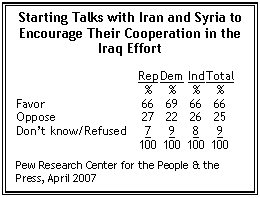
When Sen. Sam Brownback was asked if he approved of Secretary of State Rice’s recent meeting with Iranian officials to discuss Iraq, he responded that the U.S. should be talking with Iran. A majority of Republicans support this position, with 66% favoring talks with Iran and Syria to encourage their cooperation in the Iraq effort. This is a rare instance of bi-partisan agreement on an issue related to the Iraq war and terrorism, as about two-thirds of the general public (66%), Republicans (66%) and Democrats (69%) agree that talks are a good idea. At the same time, however, Brownback and Rep. Duncan Hunter also expressed support for the Bush administration’s decision not to open up full diplomatic relations with Iran. Their views are in line with the views of 61% of Republicans, who express approval of the President’s dealings with Iran.
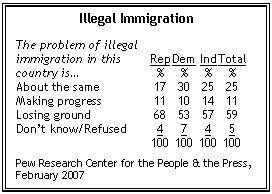
Immigration
Immigration (63%) now ranks behind only terrorism (77%), the economy (68%) and Iraq (64%) as an issue that Republicans say will be very important to their vote. The general public, on the other hand, ranks it below several other issues, with just 54% saying it will be important to their vote. Likewise, more than two-thirds (68%) of Republicans say that the country is losing ground on illegal immigration, compared with just 59% of the public at large.
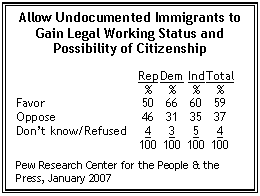
GOP voters are nearly evenly split over a proposal to allow undocumented immigrants who have been in the U.S. for several years to gain legal working status and the possibility of citizenship – with 50% favoring it and 46% opposing. Among the 10 candidates at the GOP debate, only McCain stated clearly that he is in favor of the current bipartisan legislation before Congress that contains such a provision. By contrast, all candidates who addressed the issue of a more secure border fence said they favored such a provsion; by a margin of 65%-29%, Republican voters support such a provision as well.
English Only
All the GOP candidates except McCain voiced unequivocal support for making English the official language of the U.S.; with Rep. Tom Tancredo observing that it is what “holds us together.” Rank-and-file Republicans (49%) are more likely than the general public (38%) to say that it bothers them when they come in contact with immigrants who speak little or no English; they also are less likely to say that recent immigrants learn English in a reasonable amount of time (29% to 35%).
Religion and Evolution
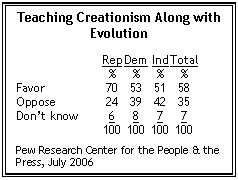
When former Arkansas Gov. Mike Huckabee was asked about his views on evolution and creationism, he responded by asserting his faith in God. Republicans (50%) are more likely than the general public (41%) to say that a supreme being guided the evolution of living things for the purpose of creating humans. McCain was asked whether creationism should be taught along with evolution in schools; he replied that this question should be left up to local school districts. Republican voters are strongly in favor of teaching creationism along with evolution, with 70% in favor and just 24% opposed. A majority of the general public (58%) and of Democrats (53%) are also in favor of teaching creationism with evolution, though the margins are not as large as they are among Republicans.
Abortion
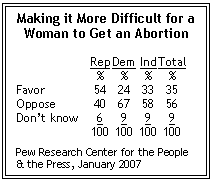
In response to a question, Giuliani reaffirmed his support for a woman’s right to choose, despite his personal disapproval of abortion. While abortion is not a top-tier issue among voters of either party – with just 43% of Republicans and 38% of Democrats saying it will be very important to their voting decision – it continues to be a divisive issue. Brownback was clearly talking about Giuliani when he said, “I don’t think we can nominate somebody that’s not pro-life in this party because it is at our core.” Some 54% of Republicans say they would like to make it more difficult for a woman to get an abortion; the public at large is less supportive of this view, with just 35% saying they favor making abortion more difficult. Giuliani’s views on abortion are not widely known among the GOP electorate; just 43% of Republicans in the latest Pew survey, taken earlier this month, were able to identify him as the GOP’s pro-choice candidate.
Conservatism
The question of which Republican candidate possessed the most bona fide conservative credentials played out in a variety of ways during the debate. When asked whether potential candidate Fred Thompson was conservative enough for America, former Gov. Jim Gilmore said he didn’t know what kind of candidate Fred Thompson would be, but that his own record was one of standing up for conservative values and principles. Former Gov. Thompson responded to a similar question by saying that it was Tommy Thompson, not the actor Thompson, who was the most reliable conservative in the field. Republican voters may be looking for a candidate with conservative credentials to challenge the top tier. In a March 2007 survey, when asked to rate the ideology of front-runners Giuliani, McCain and Romney on a scale from one to six, where one represents a very conservative position and six very liberal, Republican voters scored Giuliani 3.2, McCain 3.1 and Romney 3.0. Republicans scored themselves 2.6, more conservative than any of the leading candidates.
Government Efficiency
When asked about health care, Romney and Giuliani both described their proposals as market driven rather than the “socialized medicine” that Democrats had proposed. Romney said: “The last thing we want is to have the government take over health care, because anything they take over gets worse, not better.” Surprisingly, somewhat more Democrats (65%) than Republicans (61%) agree that when something is run by the government it is usually inefficient and wasteful, according to a January 2007 survey. On the other hand, Democrats are more inclined than Republicans to support raising taxes to provide health care coverage.
President Bush
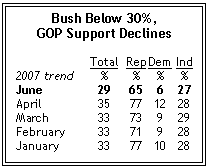
On issues ranging from immigration to the prosecution of the war in Iraq, President Bush came under periodic criticism during the GOP debate. These slings and arrows come at a time when Pew polling finds disapproval of Bush’s job performance outnumbering approval by more than two-to-one (61% disapprove, 29% approve) — the lowest ratings of the Bush presidency. Even among Republicans, fewer than two-thirds (65%) now approve of the President’s performance, down from 77% in April.


